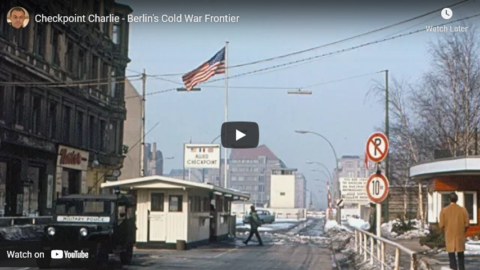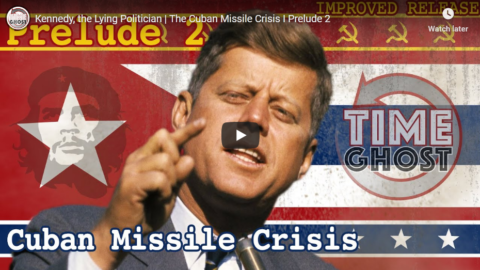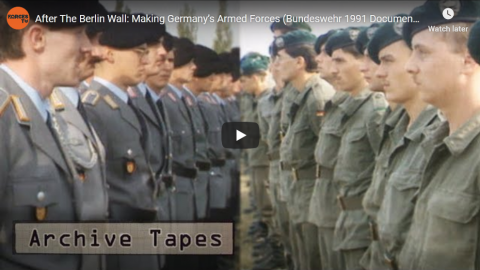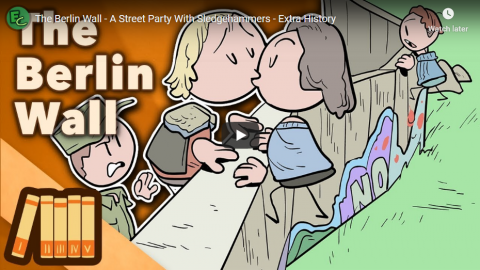Mark Felton Productions
Published 4 Dec 2018The history of Checkpoint Charlie, the most famous of Berlin’s East-West crossing points and the focus of a serious standoff between the US and Soviet Union in 1961 that could have led to World War III.
Support Mark at Patreon for $1 a Month!
https://www.patreon.com/markfeltonpro…
March 4, 2022
Checkpoint Charlie – Berlin’s Cold War Frontier
July 2, 2020
Kennedy, the Lying Politician | The Cuban Missile Crisis I Prelude 2
TimeGhost History
Published 1 Jul 2020The Cold War grows gets more and more tense as both the USSR and the US try to get the upper hand through the volume of nuclear weapons and strategic launching sites – including Cuba.
Join us on Patreon: https://www.patreon.com/TimeGhostHistory
Hosted by: Indy Neidell
Written by: Spartacus Olsson
Director: Astrid Deinhard
Producers: Astrid Deinhard and Spartacus Olsson
Executive Producers: Astrid Deinhard, Indy Neidell, Spartacus Olsson, Bodo Rittenauer
Creative Producer: Joram Appel
Post-Production Director: Wieke Kapteijns
Research by: Spartacus Olsson
Edited by: Daniel Weiss
Sound design: Marek KaminskiColorizations:
– Carlos Ortega Pereira (BlauColorizations) – https://www.instagram.com/blaucoloriz…
– Daniel WeissSources:
– New Georgia EncyclopediaSoundtracks from Epidemic Sound:
– “Cold Eyes” – Elliot Holmes
– “Juvenile Delinquent” – Elliot Holmes
– “Nightclub Standoff” – Elliot Holmes
– “Scope” – Got Happy
– “Zoot Suit” – Elliot Holmes
– “Car Chase in Virginia” – White Bones
– “When They Fell” – Wendel Scherer
– “Kissed by Thunder” – Elliot HolmesArchive by Screenocean/Reuters https://www.screenocean.com.
A TimeGhost chronological documentary produced by OnLion Entertainment GmbH.
May 2, 2020
After The Berlin Wall: Making Germany’s Armed Forces (Bundeswehr 1991 Documentary)
Forces TV
Published 5 Jan 2018It’s more than 27 years since German reunification, when East and West Germany came together again after the fall of the Berlin Wall. This documentary looks at the challenges facing the West German Army as they took over the East German National People’s Army.
Read more: http://www.forces.net/news/comment-bu…
Subscribe to Forces TV: http://bit.ly/1OraazC
Check out our website: http://forces.net
Twitter: https://twitter.com/ForcesNews
How things change … back in 1991, the Bundeswehr had a vast over-supply of military vehicles between the mass of Soviet-era equipment inherited from the DDR and the excess due to planned down-sizing of Germany’s overall military expenditure (the “peace dividend”). Earlier this year, Bild reported that German soldiers are being advised to take personal vehicles during military training exercises, due to a lack of infantry fighting vehicles and other military transport.
November 11, 2019
The Berlin Wall – A Street Party With Sledgehammers – Extra History
Extra Credits
Published 9 Nov 2019Thanks to World of Tanks for sponsoring this episode. Download the game on PC and use the invite code
CHECKPOINTCto claim your $15 starter pack https://tanks.ly/2NoVfjx.The Berlin Wall has become a symbol of the Cold War. It encircled West Berlin, separating it from the Soviet-controlled East Berlin, placed to try and stop the flood of skilled professionals leaving to the West. Multiple US presidents had penned speeches about tearing down the wall, to no effect. But the Wall did fall. As the USSR underwent massive reforms and the Velvet Revolution was underway, East Germany was undergoing its own reform. And one clerical oversight in a press conference will destroy the Wall for good.
Update: Austin Bay linked to a column he wrote in 2009 on the 20th anniversary of these events.
Many in the West, including the U.S., believed that the communists had history on their side. The wry debate reply from the defeatist lefties favoring unilateral U.S. nuclear disarmament was “better Red than dead.” For decades — I repeat, decades — this crowd had a media pulpit from which its self-proclaimed intelligentsia preached the moral equivalency of the U.S. and the Soviet Union, and at times dropped the all pretense and fingered the U.S. as the “fascist state” and global oppressor.
In the language of the defeatist left, the U.S. was the jailer, the warmonger, the threat to world peace.
The Berlin Wall’s collapse exposed that Big Lie, as did the documented moral, political, economic and ecological wretchedness of the Soviet Union. Unfortunately, we still hear echoes of this “blame America” cant lacing al-Qaida propaganda and the lectures of hard-left reactionaries like Bill Ayers. The great anti-American lies of the Cold War are recast as the great anti-American lies of the War on Terror.
Breaching the wall in 1989 was bloodless, but the Cold War certainly wasn’t. World War III did not break out along the intra-German border and produce a nuclear conflagration, but the Cold War’s battles on the periphery (e.g., Greece, Korea, Vietnam, El Salvador, Angola, Afghanistan) were expensive, fatiguing and deadly.
January 28, 2019
The Cold War – OverSimplified (Part 2)
OverSimplified
Published on 24 Jan 2019
January 26, 2019
The Cold War – OverSimplified (Part 1)
OverSimplified
Published on 24 Jan 2019
November 5, 2015
QotD: The Berlin Wall
The Berlin Wall was a symbol of the depravity and viciousness of the Marxist idea. Karl Marx was a pure hate monger masquerading as a social philosopher. His ideas may, in the end, be summarized thus: wealth can be gained only by stealing from others, and thus successful people are evil, and thus it is okay to threaten or kill rich people (or even people who are just a bit better off than you are), to steal their belongings, and to threaten anyone who might in the future have more stuff than you do. If you somehow get more things than other people, it is okay for other people to take your stuff, and if you resist, it is okay to beat you up or kill you.
Even more succinctly, Marxism is the idea that envy is laudable, and should be turned into social policy with the use of pervasive violence.
I am putting this more bluntly and baldly than the average Marxist would. They prefer concealing their central idea beneath a heavy blanket of words. They dress up their “philosophy” in avant garde costumes, adding layers of verbiage, complicated and counterfactual claims about language and logic, bizarre ideas about the nature of history, etc., all in the service of keeping people from seeing what they’re actually suggesting. What lies underneath is nothing much more than hate of people who have more stuff than you do, justified by little or nothing more than wanting to take what they have for yourself.
When you base your beliefs on this sort of foundation, the violence that proceeds is not an accident or the result of an improper understanding or implementation of an otherwise fine program. The violence is the direct and intentional result of the underlying program. The violence is the entire purpose of the underlying program.
In spite of the claims of apologists, the Marxism that fell twenty five years ago was the true Marxism. You cannot force people to work whether they get any benefit of it or not if they can flee from you, so you have to build walls. The Berlin Wall was not an aberration, it was the the only way to keep the quite literal slaves from fleeing their bondage. You cannot take stuff from people who have it without goons with guns, since they will not want to hand their material possessions over, so you bring in goons with guns to scour your population. In a free market, you get ahead by making things people want like bread or telephones, but in a Marxist society, the only way to get ahead is through gaining political power, and so people who are exceptionally talented at deploying violence and thuggery and are ambitious rise to the top of your society. Stalin or someone like him was not an accident, he was an inevitability.
Perry Metzger, “A memorable anniversary, and those who would forget it”, Samizdata, 2014-11-09.
February 5, 2012
November 9, 2009
Beware of Ostalgia, both left and right
Steve Chapman warns about the dangers of indulging in too much nostalgia one both sides of the divide:
Communism was the greatest catastrophe of the 20th century, and one of the greatest in human history. Twenty years ago, suddenly and improbably, it fell into its death throes.
The end began the night of Nov. 9, 1989, when the Berlin Wall was opened, allowing East Germans to leave the prison that constituted their country. Throughout Eastern Europe, one Communist regime after another disintegrated. Within two years, the Communist Party of the Soviet Union was not only out of power but banned by law. A system soaked in the blood of millions was gone.
It was the most dramatic, life-affirming, and miraculous event of our time. And for those of us in the West, it is one from which we have yet to recover.
The Cold War was often grim and scary. For four decades, we had to maintain vast defenses against a numerically superior enemy that threatened the freedom of our allies and, by extension, ourselves. We lived with the daily reality that, with the push of a button in the Kremlin, we would all be dead in half an hour.
But the “long twilight struggle,” as John F. Kennedy called it, was also inspiring. It gave us a purpose greater than ourselves. In those days, most Americans understood it was our national duty to prevent the spread of the most malignant force on earth, lest it enslave us all.
That may sound absurd to anyone who has grown up since 1989. But there were serious people who feared the worst. British Prime Minister Margaret Thatcher thought that in the 1970s, the West was “slowly but surely losing.”
Our unequivocal victory brought joy, but it also created something else: a void in our lives. If upholding freedom and democracy against a global enemy was not our purpose, what was?
November 6, 2009
QotD: The end of the Cold War
So for us, Cold War military realities were axioms, facts as tangible as a pound of cheese. There was always an unstated feeling of “Sooner or later.” Sooner or later, the bill would come due. Sooner or later, some of our paratrooper neighbours would get dropped into the Fulda Gap to get chewed up by artillery or crushed to red porridge by tank treads. Sooner or later, the classes at our school would be interrupted by sirens, bright light, and about five pounds per square inch of overpressure.
And then suddenly, in a few weeks in the autumn of ’89, some people very far away decided to call off World War Three. Our nightmares got cancelled like a sitcom. When I talk to other Canadians about what happened in 1989 in Romania and Hungary and Germany, they remain impressed by the courage with which the people of the old Warsaw Pact seized their birthright of political freedom. What’s sometimes lacking is the element of personal gratitude — the sense that those rebels gave us something precious while taking liberty for themselves. Well, I was grateful then. And I still am.
Colby Cosh, “My Cold War”, National Post, 2009-11-06







